Act Four 1997-1998.
TAKING THE REGION
The Marinduque Office of the Department of Education, Culture & Sports (DECS), approached Obligacion to handle the provincial drama entry to the regional competition on culture & the arts. A revised version of “Mis Lagrimas A Ti”, now retitled “HIMAGSIK NG BUDHI” was brought to San Jose, Batangas for the competition with some 25 actors from MNHS and ICC. Virtusio was tapped to direct the play that was awarded 2nd runner-up.
The Philippine Independent Church (PIC), in Gasan in cooperation with the municipal government was to handle the “Pugutan” presentation in 1997. The mayor approached Obligacion for assistance in terms of provincial funding and the conduct of the activities. He introduced Virtusio to the mayor and the parish priest recommending him to direct their Holy Week play. PIC commissioned Obligacion to write a new play on the Passion of Christ and the involvement of Longinus. Apparently the Celso Carunungan script introduced in the 70s had been altered many times by whoever organized the annual “Pugutan” and now considered incoherent.
On condition that the “Pugutan” play would not take the place of the Easter Sunday street festival observed in Gasan as was the experience in Boac, Obligacion agreed to write it, in consultation with Fr. Arevalo of PIC who provided some literature. “SA NGALAN NG KATOTOHANAN" (changed to “KASAYSAYAN NI LONGHINO”) was finished by end of January 1997 in time for the start of rehearsals the following month. Curiously, however, the play’s programme drafted by the director was an insult to the playwright. The name of the priest in his capacity as “Katulong sa Produksyon” (Production Assistant), and that of the director in huge letters occupied a wide space on top of the page. In small letters somewhere under the names and positions of the production and technical staff was the following entry: “Dialogues by:Eli Obligacion”.
A couple of years later the same script, now corrupted, would be presented several times elsewhere in Marinduque by a new playwright: Virtusio.
The Department of Agrarian Reform (DAR) then sponsored a national competition on theater arts for the promotion of the government’s land reform program. For the regional competition Obligacion accepted the challenge to write and direct a new play based on a storyline provided by DAR and adopted to the local situation. Students of Cawit National High School who were mostly children of farmers and fishermen were the choice as players. They were given a new identity as “BALANGAI PEOPLE’S THEATER”. “ARKO”, Marinduque’s entry was awarded 2nd runner-up in the competition participated in by the region’s eleven (11) provinces. The winning play was presented in Boac upon the invitation of the municipal government for the celebration of the 3rd anniversary of the Marcopper mining disaster, and for the municipality’s Philippine centennial celebration at the Boac riverside arena.
VIDEO & BOOK PROJECT WITH PETA AND IDEA (NETHERLANDS)
In May 1997 the Philippine Educational Theater Association (PETA) and Balangaw undertook a drama project (opposed by Mandia who was negative about PETA), on the issue of the Marcopper mine spillage. PETA is the biggest theater institution in the country with over two decades of experience in developing acting techniques for community-based theater and had produced the biggest names in Philippine theater, movie and television.
Balangaw members underwent training under PETA’s basic integrated theater arts workshop (BITAW) program for five days, culminating in the presentation of “PUTIK SA KARAMIHAN, GINTO SA IILAN”. The project that involved interviews with the Balangaw cast and some of their parents was documented on film by Oceanic Films for showing in European cable-TV under the title “Swapping Stories”. Facilitators were Ernie Cloma, Dessa Quesada, (both of PETA), and Obligacion.
A book entitled “COMMUNITY THEATER: GLOBAL PERSPECTIVES” by Eugene van Erven (Netherlands), a renowned expert on community theater, was later published. It detailed a case study made on Balangaw (for Philippines) in 1997, together with individual stories of community theaters from five other countries namely Kenya, Australia, Netherlands, U.S., and Costa Rica.
Chapter 1 of the book about ‘Philippine Community Theater in the 90s and a Case Study on Teatro Balangaw, Marinduque’ could be browsed at the following link: Global Perspectives.
Monday, April 11, 2005
Subscribe to:
Post Comments (Atom)



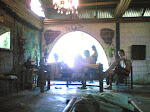.jpg)

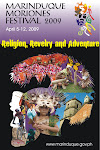

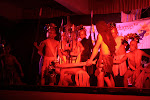


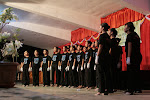

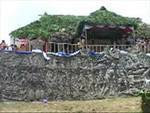



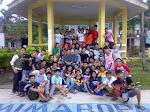

No comments:
Post a Comment